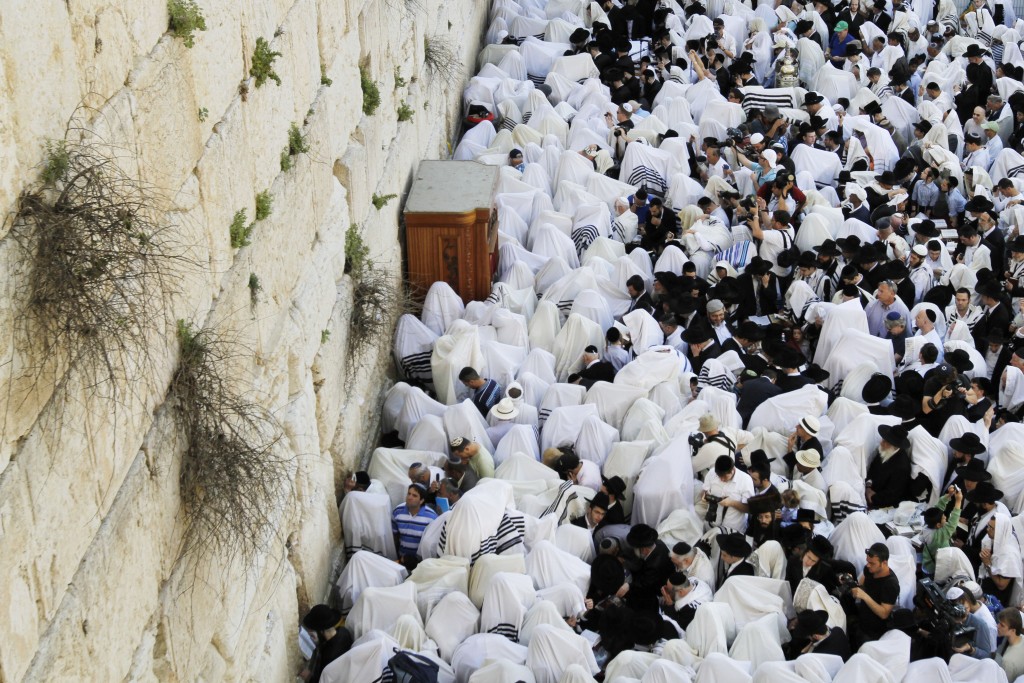
16 Jun 2016 Birkas Kohanim: Boundless Blessings
 In this week’s parsha, Parshas Naso, we are commanded regarding Birkas Kohanim, the ancient, and timeless, blessings of the Kohanim, as they simultaneously lift their hands – נשיאת כפים – upward to Hashem and outward towards the people – and transmit the blessings and bounty of Hashem to us.
In this week’s parsha, Parshas Naso, we are commanded regarding Birkas Kohanim, the ancient, and timeless, blessings of the Kohanim, as they simultaneously lift their hands – נשיאת כפים – upward to Hashem and outward towards the people – and transmit the blessings and bounty of Hashem to us.
The words we know well: יברכך ה׳ וישמרך. יאר ה׳ פניו אליך ויחנך. ישא ה׳ פניו אליך וישם לך שלום, May Hashem bless you and guard you; May He shine His countenance upon you and endow you with grace; May Hashem lift His countenance to you and establish peace for you (Bamidbar 6:24-26).
The Ba’al Ha’Turim teaches that the Divine blessings will come to us in the merit of the forefathers.
יברכך – Hashem will bless you – in the merit of Avraham, about whom it is said: וה׳ ברך את אברהם בכל – And Hashem blessed Avraham with all (Gen.24:1);
יאר – Hashem will illuminate – corresponding to Yitzchak, who died when he was bound upon the Akeidah, and Hashem illuminated his eyes and he was brought back to life;
ישא – May He lift up – corresponding to Yaakov, about whom it is written, וַיִּשָּׂא יַעֲקֹב, רַגְלָיו, And Yaakov lifted his feet (Gen.29:1).
The shefa bracha, Divine flow of blessings, will descend to us in the merit of the patriarchs, the founders and fathers of the Umah Yisraelis… But it is our takfid to continue along they paths that they began.
From Avraham we learn how to live lives of chessed, giving of ourselves to others – וַיִּשָּׂא עֵינָיו, וַיַּרְא, וְהִנֵּה שְׁלֹשָׁה אֲנָשִׁים, נִצָּבִים עָלָיו; וַיַּרְא, וַיָּרָץ לִקְרָאתָם – And Avraham Avinu left his pain behind as he ran to welcome guests to his home;
From Yitzchak we learn how to offer ourselves up to the Almighty, as we humble ourselves before Him in sincere prayer, and negate our will to His will – וַיַּעֲקֹד, אֶת-יִצְחָק בְּנוֹ, וַיָּשֶׂם אֹתוֹ עַל-הַמִּזְבֵּחַ, מִמַּעַל לָעֵצִים – And Yitzchak submitted himself to the will of Hashem, in order to come close to Him through avodah;
From Yaakov we learn how to lift ourselves up by clinging to Torah, its beauty, its depth, its light and its ways – וְיַעֲקֹב אִישׁ תָּם, יֹשֵׁב אֹהָלִים, And Yaakov was a simple man, a dweller in the tents of Torah.
Thursday night, Rebbetzin Chaya Rivka Auerbach a’h (1912-1983) felt unwell; Shabos she was gone. At the seuda shlishis that Shabos, R’ Shmuel (the Auerbach’s eldest son), began to weep and his father, R’ Shlomo Zalman zt’l, admonished him for allowing his sorrow to desecrate the holy Shabos. However, when Shabbos was over R’ Shlomo Zalman’s own sorrow burst its bounds…
In the modest Auerbach home, lived the Rebetzin’s frail and elderly mother. The consensus among the family members was to conceal the tidings from their grandmother, at least until after the funeral, lest the news prove fatal to someone in such delicate condition.
R’ Shlomo Zalman emphatically disagreed. Quietly the Rav entered his mother-in-law’s room and gently closed the door. She lifted her eyes and saw the pain on his face. With utmost respect, he said, “You know that the Holy One is good and all that He does is good. Sometimes we understand His ways, and sometimes we do not. You should know that the Almighty in His wisdom has taken your daughter to a place that is entirely good, and now you and I will together recite the blessing of Dayan Ha’Emes, word by word, without crying.”
Silence filled the tiny room. Then the elderly woman asked in a quavering voice, “How can I say it without crying?” “All your life you have been a tzadekes,” her son-in-law replied, “You are able to accept this trial as well.”
Together the grieving mother and husband recited the blessing, word after word, without a tear, affirming their conviction that the Almighty G-d is the True Judge. By the time the gaon rejoined the family in the next room, he was sobbing uncontrollably and near collapse.
Later that night, at the funeral, he bade farewell to his Rebbetzin with these inspiring words: “It is customary to request forgiveness from the deceased. However, I have nothing to ask your forgiveness for. During the course of our relationship, never did anything occur that would require either of us to ask the other’s forgiveness. Each of us led our life in accordance with the Shulchan Aruch.” (And from J’lem, His Word, p.371-374)
And I will bless you – in the merit of Avraham Avinu and our continuing acts of chessed; And I will illuminate My countenance upon you – in the merit of Yitzchak and our submission to ratzon Hashem; And I will lift you up – in the merit of Yaakov and our devotion to Torah, for it is our life and the length of our days.
בברכת בשורות טובות ושבת שלום,
Michal



Sorry, the comment form is closed at this time.